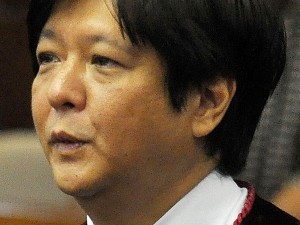PH-China talks on sea row pushed
Two senators on Sunday urged Malacañang to reconsider bilateral talks with China amid new tensions in the area over the issue of United States reconnaissance flights over disputed islands.
Both Senators Ferdinand Marcos Jr. and Francis Escudero, expressing fears that the Philippines might be caught in the middle of a skirmish between superpowers China and the United States, said that the Palace could also complement such talks with back-channeling, or the use of unofficial and informal communication to help ease the situation.
Escudero, in a radio interview, likewise pitched for the convening of the National Security Council (NSC) to talk about the latest developments.
“We should be careful that we won’t be caught in the middle of the two giants—China and the United States—because in the end, it might be that the two countries would reconcile and we end up still fighting with China (over the issue),” Escudero told dzBB radio.
Escudero earlier called for the convening of the NSC, which President Aquino can do. But the Palace has not been receptive to the idea.
The senator referred to the incident last week where the Chinese Navy warned a US surveillance plane eight times to leave the airspace over artificial islands it was building in the disputed area, saying the action was “irresponsible and dangerous.” The United States, however, justified its flight as “routine” and “appropriate” and vowed to keep up its patrols over what it considered as “international waters.”
Beijing has claimed ownership over almost the entire South China Sea where various islets are also being claimed by the Philippines, Brunei, Malaysia and Vietnam. China has accelerated its expansion activities in the Spratlys, one of the contested groups of islands believed to be rich in marine resources, as well as oil and gas.
Escudero said he did not think the latest skirmish between China and the United States would end up in a shooting war between them, noting that China holds $2 trillion of US debts.
Marcos also believed there should be official and unofficial talks between Manila and Beijing over their disputes.
He suggested, for instance, businessmen doing business in China and who have friends there should help out in making these bilateral talks possible.
Marcos said the situation had become delicate in the sense that Manila could be caught in the middle of the United States and China’s current dispute.
“You have to try everything,” he also told dzBB radio, adding that the situation had become “complicated” with the entry of the United States in the South China Sea dispute.
“Should a conflict erupt between China and the United States… we (Filipinos) will be caught in the middle. We will be crushed… just think how big and rich these nations are, how many arms they have… we will be affected because we are in the middle,” Marcos said.
The senator—whose father, the late dictator Ferdinand Marcos opened diplomatic relations with China in the mid ’70s—said people should understand that in global geopolitics, the Philippines is strategically important because it is situated in an area where both commercial vessels and warships pass.
The government should not only consider the legal option in solving the dispute, he said in reference to the ongoing arbitration case that Manila filed against China before the United Nations arbitration tribunal.
China had earlier proposed the issue of the disputed islands be discussed in bilateral talks, rejecting Manila’s stand to internationalize the issue. The Philippines, however, went ahead and filed for international arbitration, questioning China’s territorial boundary claims. The Philippines has also offered US troops expanded use of its military bases.
Foreign affairs officials earlier said the country cannot engage in bilateral talks with China as this might affect its case in the United Nations.
